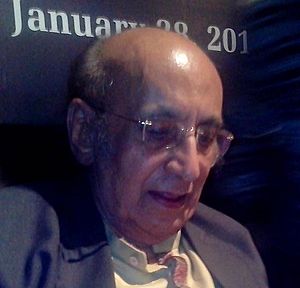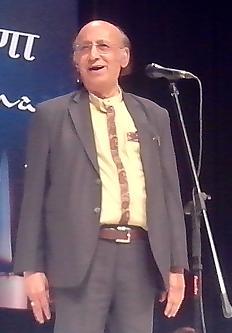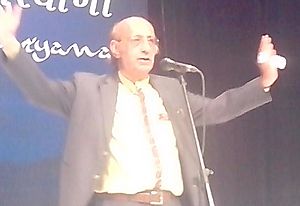Nida Fazli facts for kids
Quick facts for kids
Nida Fazli
|
|
|---|---|

(Chandigarh, 28 January 2014)
|
|
| Born | Muqtida Hasan Nida Fazli 12 October 1938 Delhi, British India |
| Died | 8 February 2016 (aged 77) Mumbai, Maharashtra, India |
| Occupation | Poet, Novelist, Lyricist |
| Language | Hindi, Urdu |
| Nationality | Indian |
| Citizenship | Indian |
| Notable awards | Padma Shri Award, Sahitya Akademi Award, Bollywood Movie Award, Indian Telly Award |
| Children | Tehreer |
| Relatives | Tasleem Fazli, Saba Fazli |
Nida Fazli, whose full name was Muqtida Hasan Nida Fazli (born October 12, 1938 – died February 8, 2016), was a very famous Indian poet. He wrote in both Hindi and Urdu languages. He was also a talented lyricist, writing songs for movies, and a dialogue writer. In 2013, the Indian government honored him with the Padma Shri award for his amazing work in literature.
Contents
Growing Up: Nida Fazli's Early Life
Nida Fazli was born in New Delhi, India. His family was Kashmiri Muslim. He grew up in Gwalior, where he went to school. Later, he studied English literature there. His father was also a well-known poet who wrote in Urdu. Nida Fazli had two brothers, Tasleem Fazli and Saba Fazli. They were also famous writers in India and Pakistan. People still enjoy their poems, film songs, and other writings today.
In 1965, his parents and other family members moved to Pakistan. This happened 18 years after India was divided into two countries. However, Nida Fazli decided to stay in India. He had already moved from Gwalior to Mumbai in 1964 to find work. His parents leaving was a very sad and important event for him. The pain of it stayed with him throughout his life.
Nida Fazli was married twice. His second wife was Malti Joshi. They had a daughter named Tehreer.
Nida Fazli's Creative Journey and Career
When Nida Fazli was young, he walked past a Hindu temple. A singer was performing a bhajan, which is a religious song. The song was by a poet named Surdas. It was about Radha feeling sad because she was separated from her beloved Krishna. The beauty of this poem, showing how people connect deeply, inspired Nida. This moment made him want to start writing his own poems.
At that time, he felt that Urdu poetry had some limits. He learned from great poets like Mir and Ghalib to express his ideas. He loved the musical style of Meera and Kabir. He also learned more about poetry by reading writers like T. S. Eliot, Gogol, and Anton Chekhov.
In 1964, he moved to Mumbai to find a job. Early in his career, he wrote for newspapers like Dharmayug and Blitz. His unique way of writing poems caught the attention of filmmakers and writers. He was often invited to Mushairas. These are special events where poets read their own poems aloud.
He became well-known for his simple and elegant style. He used everyday language in his ghazals (a type of poem), dohaas, and nazms. He avoided using difficult Persian words to make his poetry easier to understand. He wrote a famous couplet: 'Duniya jise kehte hain jaadu kaa Khilona hai Mil jaaye to mitti hai kho jaaye to sona hai'. This means "What people call the world is a magic toy; if you get it, it's just dirt; if you lose it, it's gold."
Writing for Films and TV
Some of his famous film songs include Aa bhi jaa from the movie Sur. He also wrote Tu is tarah se meri zindagi mein from Aap To Aise Na The. Another popular song was Hosh waalon ko khabar Kya from Sarfarosh.
Nida Fazli wrote a book called Mulaqatein. In it, he shared his thoughts on other poets of his time. This made some poets, like Sahir Ludhianvi and Kaifi Azmi, upset. Because of this, he was not invited to some poetry sessions for a while.
His career got better when filmmaker Kamal Amrohi asked for his help. The original songwriter for the film Razia Sultan (1983) had passed away. Nida Fazli wrote the last two songs for the movie. This helped him get more work from other Hindi filmmakers.
He wrote popular lyrics for films like Aap to aise na the and Is Raat Ki Subah Nahin (1996). He also wrote the title songs for TV shows such as Sailaab, Neem ka Ped, and Jyoti. The song "Koi Akelaa Kahaan" is another well-loved piece sung by Kavita Krishnamurthy. Many famous singers perform his ghazals and other works. In 1994, he worked with singer Jagjit Singh on an album called Insight. This album was praised for its deep poetry and beautiful music. Before he passed away, he wrote articles for the BBC Hindi website. He often mentioned the works of Mirza Ghalib in his writings.
Nida Fazli's Unique Poetic Style
Nida Fazli was a poet who could write about many different feelings. He believed that true poetry comes from a deep creative feeling inside a person. He felt that a poet's feelings are like those of a painter or a musician. However, he found writing song lyrics for movies to be more like a technical job. He had to follow the movie script and the director's ideas. Later, he accepted that writing lyrics brought in money, which helped him focus on his more creative poetry.
He published his first collection of Urdu poems in 1969. Memories from his childhood often appeared in his poetry. His main themes included the confusing parts of life and searching for meaning. He also wrote about human relationships, the difference between what people say and what they do, and looking for things that are lost.
Promoting Peace: Nida Fazli's Work for Harmony
Nida Fazli did not agree with the division of India. He often spoke out against conflicts between different groups of people. He also spoke against politicians and extreme beliefs. During the riots in December 1992, he had to stay at a friend's house to be safe.
He received the National Harmony Award for his writings that promoted peace and understanding between communities. He wrote 24 books in Urdu, Hindi, and Gujarati. Some of these books are even used as textbooks in schools in Maharashtra. His works are also in National Council of Educational Research and Training Hindi textbooks, which millions of students study. The Government of Madhya Pradesh also gave him the Mir Taqi Mir award.
Nida Fazli's Passing
Nida Fazli passed away from a heart attack on February 8, 2016. He was 77 years old. His death happened on the 75th birthday of the famous ghazal singer Jagjit Singh, with whom he had created many songs.
List of Works
Poetry collections
- Lafzun Ka Pul
- Mor Naach
- Aankh Aur Khawaab Ke Darmayan
- Khoya Huwa Sa Kuch
- Shehar Mere Sath Chal
- Zindagi Ki Tadap
- Sab Ka Hai Maahtaab
- Duniya Jise Kehte Hain
- Shehar Mein Gavaun (Kuliyaat)
Prose Collections
- Mulaqatein
- Deewaron Ke Beech (autobiography part 1)
- Deewaron Ke Par (autobiography part 2)
- Chehre
- Dunya Mere Aage
Awards and Recognitions
- 1998 Sahitya Akademi Award in Urdu for Khoya Hua Sa Kuchh (Poetry collection)
- 2003 Star Screen Award for Best Lyricist for Sur
- 2003 Bollywood Movie Award - Best Lyricist for Aa Bhi Ja from Sur
- 2013 Padma Shri; from the Government of India.
Filmography
As lyricist
- Aap To Aise Na The (1980) آپ تو ایسے نہ تھے
- Red Rose (1980)
- Nakhuda (1981) ناخُدا
- Harjaee (1981) ہر جائی
- Anokha Bandhan (1982) انوکھا بندھن
- Razia Sultan (1983) رضیہ سُلطان
- Vijay (1988) وِجے
- Sajda
- Is Raat Ki Subah Nahin (1996) اِس رات کی صُبح نہیں
- Tamanna (1997) - Ghar se masjid hai
- Sarfarosh (1999) - ہوش والوں کو خبر کیا
- Sur – The Melody of Life (2002) - (Aa bhee jaa, ai subha aa bhee jaa)' آ بھی جا اے صُبح آ بھی جا
- Dev (2004)
- Yatra (2006) یاترہ
As dialogue writer
- Dev (2004) (co-writer)
- Yatra (2006)



